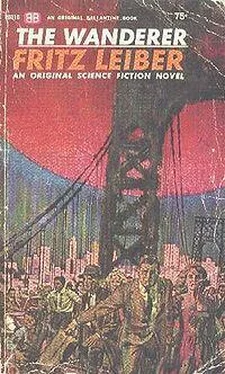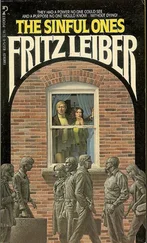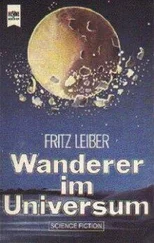One must have a plan, he told himself now, as he marched along quickly among a pack of fellow marchers, beside another double file of spattered cars slowly moving west. They crossed the Cherwell by a crowded bridge hardly two feet above a foaming flood. He wondered how salt the water was, but didn’t stop to taste.
He wondered, too, whether last night’s flooding here had come up from the Thames Estuary, or a hundred miles down from the Wash across the fenlands, roaring over the height of land between Daventry and Bicester, or even striking through gaps in the Cotswolds from the west coast, where the normal tides have a range of thirty feet. But such speculation wasn’t bringing him any closer to a plan. The sun was getting hot on his back.
There was a low, heavy drumming, and the crowd around him pressed closer to the road as a small helicopter settled to a landing fifty yards away. The pilot, a young woman in muddied nurse’s whites, sprang out and ran to the one live figure that hadn’t run away from the noise and down-draft: another young woman sitting in the mud with a baby in her arms. She took the baby from her, dragged her to her feet, and hurriedly led her to the ’copter and put her aboard. Then, making no answer to the diverse shouted questions that now began to come from the crowd, she quickly climbed aboard herself and took off.
Richard shook his head self-angrily and strode on. Watching such things made him feel horribly lonely, and got him no nearer to a plan, either.
After a bit, though, he had one formulated. He would reach the Cotswolds before the next high tide, harbor upon them during it, cross the Severn plain by way of Tewkesbury to the Malvern Hills during the next low, and finally make his way by the same stepping-stone process to the Black Mountains of Wales, which should be proof against the highest tides that might come. His ebbing exhilaration returned a bit.
Of course it might be wisest to return to the Chilterns or seek the moderate heights just east of Islip, but he told himself one ought to leave room there for the hordes that must still be pressing west, somehow, from London. Besides, he hated the thought of stopping anywhere, even on a safe-seeming height, and waiting and thinking. That was intolerable — one must keep moving, keep moving. And one feels loyalty toward a course of action one has just hammered out.
He finally told his Cotswolds-Malvern Hills-Black Mountains plan to two older men beside whom he walked for a space. The first said it was utterly impractical, a mad fool’s vaporings; the second said it would save half of England and should be communicated at once to responsible authorities (this man waved his cane wildly at a cruising helicopter).
Richard became disgusted with both of them, particularly the second, and tramped swiftly ahead, leaving them arguing loudly and angrily with each other. Suddenly all his exhilaration was gone, and he felt that both his plan and his reasonings were the purest rationalizations for an urge to rush west that had no more sense to it than the crowded scamper of the lemmings across Scandinavia to the Atlantic and death. Indeed, he asked himself, mightn’t shock and disorientation, in himself and all those around him, have stripped away civilized thought-layers and laid bare some primeval brain-node that responded only to the same call that the lemmings hear?
He continued to hurry, however, moving closer to the road and watching for an empty place or clinging-spot on one of the faster-moving vehicles. After all, lemming or no, his silly plan was all he had, and he had just remembered the most cogent objection to it made by the first man: that it was a good twenty-five miles to the Cotswolds.
As the morning tide flooded up the Bristol Channel, up the Severn, bringing wrecked ships and shredded hayricks, and buoys burst from their anchors, and telegraph poles trailing wires below, and torn houses, and the dead, flooding higher than last night, Dai Davies returned with it, past Glamorgan and Monmouth, twisting and turning like T. S. Eliot’s drowned Phoenician sailor, a fond Welshman poetic to the end, forty feet down.
Margo and Hunter, each wrapped in a blanket, occupied the bowl-shaped lookout post, which McHeath and Doddsy had scooped and wiped dry of rainwater. Above them stars twinkled to the west amid scattered clouds, but the top and eastern half of the sky were still solidly masked. Below them a narrow cone of light shone on the locked sedans and along the road toward the Valley. Since Doddsy had several battery-changes for his big flashlight, Doc had the notion of setting it on top of the boulder-block. “It’ll help whoever’s on guard to see anyone sneaking in from the Valley,” he’d said. “They’ll be apt to investigate the light, and if they’re friendly they’ll probably yoohoo. But don’t shoot ’em just for being quiet. Cover ’em and order ’em to stand first. And don’t wake the whole camp because we get a visitor. But wake me.”
Now Hunter and Margo were smoking, which flawed the perfection of Doc’s ambush — but not too seriously, they’d decided. The little orange glow as Margo inhaled lighted her hollow-cheeked face and gold hair combed down heavy and flat after last night’s salt-soaking.
“You look like a Valkyrie, Margo,” Hunter said softly in a deep voice.
She drew the gray pistol from under the blanket and held it high on her chest, so that it gleamed in the cigarette’s brief glow. “I feel like one,” she whispered happily. “I didn’t like it when the others had this gun, though it was interesting the things Doddsy noticed.”
During his and McHeath’s sentry-go, the Little Man had examined the pistol with his small flashlight and an eight-power pocket magnifier, and had discovered a fine scale alongside the violet charge-gage. “It was made by beings with finer eyesight than ours,” he had deduced. He had also discovered something else Margo had never noticed: a tiny, recessed lever on top of the grip — the lever pointed its narrow end at the muzzleward extreme of a similarly fine, circular scale. No one had any firm guess about the function of this lever, and it was decided not to experiment with it.
“I wonder on how many planets it’s killed,” Margo whispered now.
“Yes,” Hunter said, “you look like a vestal Valkyrie guarding the sacred flame of the weapon.” He hitched a little closer to her. She smelled the musk of his sweat.
“Shh — did you hear something then?” she breathed very rapidly. They stubbed out their cigarettes and waited tensely, their eyes scanning. Hunter softly crawled to the ridge crest by a route he’d memorized earlier and checked all around from there, although the other side of the ridge fell away quite precipitously for thirty feet.
The bus-and-truck camp was quiet and there was no sign of alien movement, though the whispering wind made them think of the tomb in the cave five yards away. After a while they arranged themselves as they’d been, and lit up again.
“You know, Margo,” Hunter went on where he’d left off, “I think killing those men brought you to life. It awakened you, maybe for the first time. A primal experience does that to a person.”
She nodded intently with an inward-directed smile. “Everything’s twice as real now,” she whispered. “As if reality were built of solider stuff, and yet I could see and feel more around and into it, especially people’s bodies. It’s wonderful.”
“It’s made you beautiful,” he said, laying his hand on the inside of her wrist. “More beautiful. Beautiful Valkyrie vestal.”
“Why, Ross,” she whispered solemnly, “anyone would think you’re trying to make me.”
“I am,” he said, firming his hand a little on her wrist.
Читать дальше










